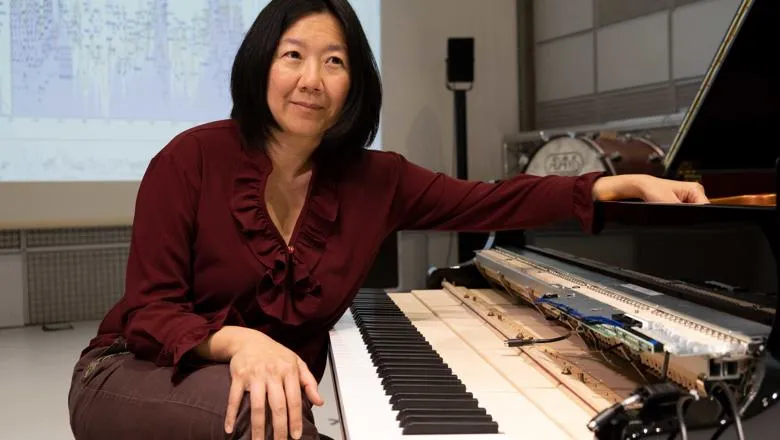Music touches the whole human experience: it not only relaxes us, but also inspires and moves us. With COSMOS we are enabling the public to mark what they sense in music and to shape it so that they probe what it is they know about music. At the same time this helps inform research about the kinds of structures people respond to in music.
Professor Elaine Chew, Professor of Engineering
31 August 2022
Professor Elaine Chew welcomed to King's Engineering
Professor Chew is warmly welcomed by both Faculty of Natural, Mathematical & Engineering Sciences and the Faculty of Life Sciences & Medicine

‘King’s Engineering’, comprised of the School of Biomedical Engineering & Imaging Sciences and the Department of Engineering, welcomes Professor Elaine Chew, a leading academic combining computer science, engineering and music. Professor Chew was most recently a senior researcher at the Centre National de la Recherche Scientifique (CNRS) in Paris.
Her dual appointment will see her co-teaching topics in data and signal analysis and supervising undergraduate and postgraduate projects in the Department of Engineering within the Faculty of Natural, Mathematical & Engineering Sciences. Professor Chew’s research will be based in the School of Biomedical Engineering & Imaging Sciences, within the Faculty of Life Sciences & Medicine.
Professor Chew’s area of research uses computational power to deconstruct expressive piano music, using the Bösendorfer ENPro42, and translates it into a clinical setting for diagnostics and therapeutics mainly for cardiovascular health but has applications beyond.
Professor Chew is achieving this through two main projects: with the European Research Council (ERC) Advanced Grant Computational Shaping and Modeling of Musical Structures (COSMOS) and Proof of Concept Maximising the Therapeutic Potential of Music Through Tailored Therapy with Physiological Feedback in Cardiovascular Disease (Heart.FM).
The overarching project COSMOS aims to find new ways to represent, explore, and talk about expressive performance, to harness volunteer thinking (citizen science) for music performance research by focusing on structures shaped by the performer and experienced by the listener.
Experts and everyday music lovers will learn to provide feedback on music structure solutions so as to increase public understanding of the creative work in music performance.
Professor Chew’s ERC Proof of Concept project, Heart.FM, takes listeners’ experienced music structures to the next level to developing a mobile app to personalise medical music interventions based on physiological feedback.
The project exploits advances in wearable ECG monitors and portable blood pressure sensors, delivering music therapy based on individual users’ physiological feedback corresponding to notable moments in their listening experience.
The citizen science platform, CosmoNote, is the basis of how the team represents and displays information in both COSMOS and HEART.FM.
It will be used to manage collections of performed musical pieces for participatory science studies. The objective is that the platform will permit the team to carry out its analyses on performance and the musical structures perceived.
The research will increase the team’s comprehension of expressive variations in music and could lead to applications notably in the health domain such as, for instance, explaining physiological responses to music.
The tools for capturing the dynamics of musical variation could be applied to depicting anomalies in cardiac rhythms and provide new ways of representing and understanding variations within cardiac arrhythmia.
Professor Chew has also been making and presenting music compositions based on electrocardiographic recordings of cardiac arrhythmia. The first such pieces were made at Harvard’s Radcliffe Institute of Advanced Study with the help of students jointly majoring in subsets of music/maths/computing/bioengineering.
They extracted ECG features and semi-automatically transcribed difficult cardiac rhythms of ventricular and atrial arrhythmias.
Professor Chew made a set of piano pieces, The Arrhythmia Suite, by finding and collaging existing music snippets that match the heartbeat data. In the pipeline are pieces based on ECGs from the University of Zurich and St Thomas'.
Professor Chew's research presents new frontiers in the health and engineering domains. Her work is showcasing a truly multidisciplinary and collaborative approach, expanding the scope of healthcare engineering research. We welcome Professor Chew to the School of Biomedical Engineering & Imaging Sciences!
Professor Sebastien Ourselin FREng, Head of School of Biomedical Engineering & Imaging Sciences
King's Engineering did very well in the recent REF2021 results, and we are committed to strengthen and grow the collaboration between the School of Biomedical Engineering & Imaging Sciences, and the Department of Engineering. Professor Elaine Chew’s joint appointment is an example of this commitment and I welcome her warmly to the College.
Professor Bashir Al-Hashimi, Executive Dean of the Faculty of Natural, Mathematical & Engineering Science
We are delighted that Professor Chew has joined us and are excited by the first joint appointment between our Department and the Health Faculty. Her research and her approach to education is a perfect fit for the multidisciplinary nature of our Department. We extend our warmest welcome to her as she joins King’s.
Professor Barbara Shollock, Head of the Department of Engineering

